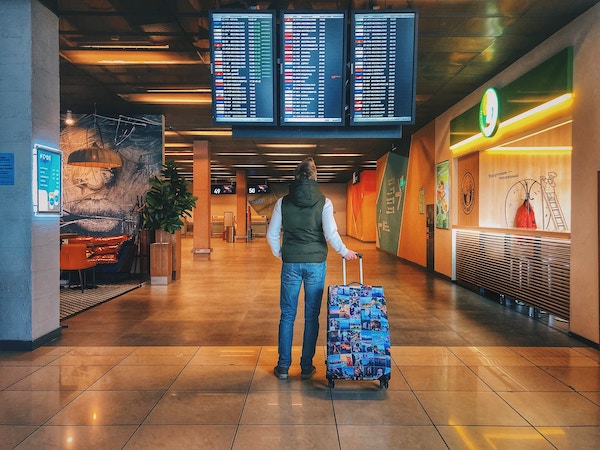This international travel and prejudice essay is about the negative feelings that may be generated when someone travels abroad.
Essays and questions about the way that people travel much more widely these days are fairly common in IELTS. This happens due to rising incomes and cheaper travel options.
This is the question:
| International travel sometimes makes people prejudiced rather than broad minded. What may be the reasons for this? What can people do to improve their understanding of the countries they visit? |
Confusing Words
Occasionally, an IELTS essay may contain words that you are unsure of, such as “prejudiced” and “broad-minded” in this essay.

If you don’t know the words, then you will have to look at the question carefully and make the best guess you can.
By looking at the context and the words around it you can usually work it out.
Being “prejudiced” is having an unreasonable or unfair feeling or opinion about something, especially when formed without enough knowledge or thought.
Someone who is “broad-minded” is willing to accept and respect other people’s beliefs and behavior that differ from one’s own.
Organisation
This is a causes / reasons and solutions essay.
You have to say:
- Why international travel may make people prejudiced
- What can be done about it
With an essay like this, you could write a paragraph about the causes, then another paragraph about the solutions.
- Body Paragraph One: Causes
- Body Paragraph Two: Solutions
Or you could make each paragraph about a cause, then the solution:
- Body Paragraph One: One Cause + One Solution
- Body Paragraph Two: One Cause + One Solution
Of course, in option two, you would need to make sure the solution is specifically related to the cause before it.
Now, take a look at the model answer and the comments below.
Which organisation does it follow?
| You should spend about 40 minutes on this task. Write about the following topic: International travel sometimes makes people prejudiced rather than broad-minded. What may be the reasons for this? What can people do to improve their understanding of the countries they visit? Give reasons for your answer and include any relevant examples from your own experience or knowledge. Write at least 250 words. |
Model Answer:
International travel is regarded as one of the finest ways of broadening one’s outlook by understanding the diversity of different places, the people, their culture, and lifestyle. On the downside, international travel has also led tourists to become biased and cold instead of receptive and indulgent.
One of the primary causes aiding this unwanted outcome is that what is considered sacred in one place may not hold any value for the tourists. In Arab countries, for instance, women are required to wear a burka or unrevealing clothes, and Western women, not realizing the importance of being fully clad, may develop an aversion to why women in these countries are treated the way they are. And vice versa, a tourist hailing from a reserved background may not identify with the Western culture, and feel appalled by the lifestyle of people there through not knowing better. Research prior to the trip can resolve this, or if there is a tour guide or organizer, they must take it upon themselves to educate the tourists about the local values and culture in a way that they understand and empathize with, rather than look down upon it.
Stereotyping is another significant cause of prejudice among tourists. The source of stereotyping is media portrayal of certain countries, places, and people, which is why tourists have preconceived negative opinions about these places when they arrive. Without really getting to know the local people, a trip may just accentuate these views. Awareness is the only cure to break the stereotypes, and for this interaction amongst the local people and the tourists must be rallied by encouraging home stays so that the differences between reality and media portrayal can come to the surface.
In conclusion, international tourism does have its problems, which can lead to prejudiced views. However, efforts in the right direction can overcome them.
Evaluation of the Response
Task Response: Band 7
- Strengths: The essay directly addresses both parts of the question. The causes of prejudice due to international travel are explained clearly, such as cultural misunderstandings and stereotyping. The writer also provides solutions, like research before traveling, education by tour guides, and encouraging interactions with locals, to improve understanding and empathy.
- Weaknesses: The essay could have explored more deeply how travel can actively help in overcoming prejudice and broaden people’s minds. Although the solutions are provided, they are somewhat general and could benefit from specific examples or more detailed reasoning.
Coherence and Cohesion: Band 7
- Strengths: The essay has a clear structure with an introduction, body paragraphs, and a conclusion. Ideas are generally well-organized, and there are effective transitions like “One of the primary causes,” “And vice versa,” and “Stereotyping is another significant cause.”
- Weaknesses: Some transitions could be smoother, particularly between the discussion of cultural differences and the solution of “research prior to the trip.” The ideas in the second body paragraph also shift quickly from stereotyping to the solution without a clear bridge. More cohesive devices would help link these ideas more fluidly.
Lexical Resource: Band 7
- Strengths: The writer demonstrates a solid range of vocabulary appropriate for the task. Phrases like “sacred,” “aversion,” “receptive and indulgent,” “stereotyping,” and “accentuate” enhance the depth of the argument.
- Weaknesses: Some phrases are slightly awkward or used incorrectly:
- “A tourist hailing from a reserved background” could be better as “A tourist from a more reserved background.”
- “To resolve this” could be clearer as “To prevent this.”
- “Through not knowing better” should be “without understanding better” or “without a better understanding.”
- “Rather than look down upon it” could be more naturally phrased as “rather than look down on it.”
Grammatical Range and Accuracy: Band 6
- Strengths: The essay shows some complex sentence structures, such as “Research prior to the trip can resolve this, or if there is a tour guide or organizer, they must take it upon themselves to educate the tourists about the local values and culture.”
- Weaknesses: Several grammatical issues reduce clarity:
- Article Usage: “In Arab countries” should be “In some Arab countries” to avoid generalization.
- Preposition Use: “May develop an aversion to why women in these countries are treated the way they are” could be more clearly phrased as “may develop an aversion to the reasons why women in these countries are treated the way they are.”
- Tense Consistency: “Research prior to the trip can resolve this” should be “Research prior to the trip could resolve this,” as the context suggests a hypothetical situation.
- Clarity of Ideas: “A tourist hailing from a reserved background” might be clearer as “A tourist from a more reserved background may not understand or relate to Western culture.”
- Pronoun Agreement: “If there is a tour guide or organizer, they must take it upon themselves” could be clearer by replacing “they” with “he or she” for clarity or rephrasing the sentence structure.
Overall Band Score: 6.5
The essay effectively addresses the question and presents relevant solutions to the issue of prejudice among tourists. However, it would benefit from more detailed analysis, clearer connections between ideas, and greater accuracy in grammar and vocabulary. With some improvements in cohesion and grammar, this response could reach a higher band.

Leave a Reply